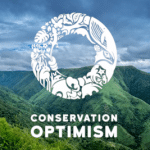Wondering what went right this week in the conservation world? We’ve got you covered with our Conservation Optimism Round-Up! Each week we are collating stories of optimism from around the globe so that you never miss your dose of Monday Motivation.
1. Mongolian saiga are bouncing back from the brink
“In 2001 there were only 750 Mongolian saigas left in the world. Today, this critically endangered ungulate shows hopeful signs of recovery “
#Conservation #Success #Mongolia
— Tom Gray (@MekongTom) April 1, 2021
Community focused efforts recovering iconic #Saiga@WWFMongolia #ConservationOptimismhttps://t.co/pmrelq6d6A pic.twitter.com/FZtoIWaAXl
2. Endangered condors return to northern California skies after nearly a century
“Yurok Tribe will create a captive breeding facility in Redwood national park for birds that could be released as early as this fall “
3. Texas and Philly Join Movement to Dim Lights at Night – Making it Safer for Migrating Birds
“Lights Out programs, organized by conservation and civil society groups like the Audubon Society, have sprung up in 20 different states, plus D.C. and Toronto, and involve enlisting the help of landlords, their tenants, and business owners to make cities safe for migratory birds in the spring and fall..“
Dim the light pollution to help migratory birds. #birds #lightpollution #conservationoptimism https://t.co/mY9N4yR5RT
— Pam (@drunkvegans) March 29, 2021
4. The Rainforest Trust is saving habitat in Laos to conserve the rare Asian unicorn
“The new protected area encompasses over 133,00 ha of one of the last remaining relatively undisturbed wet evergreen forests in the Greater Annamites. “
A new protected area in #Laos conserves over 133,000 ac of #tropical #forest for a variety of #endangered #wildlife, including the #Saola!
— Global Conservation Solutions (@_GCS_) March 30, 2021
(Photo: David Hulse) #rainforest #protectedareas #nature #news #conservationoptimism #conservation #LetNatureThrivehttps://t.co/X1JmMCcB0j pic.twitter.com/gTXu1sKZMd
5. Find out how communities are engaging in Fishing Cat conservation
“The Fishing Cat project ‘Know thy Nature’ program is engaging communities in West Bengal in conserving and monitoring wild fishing cats “
6. Government to ban advertising of ‘cruel’ elephant ride holidays
“Under the proposals, advertising or selling low welfare tourist experiences to consumers at home that involve Asian elephants could be banned. This would include elephant rides, washing or bathing with elephants, elephant shows or bottle feeding baby elephants.”
Travel companies can no longer advertise elephant riding holidays in the UK. This is a great step toward more humane wildlife tourism. When traveling, only view elephants in the wild and maintain a no-touch policy. #ElephantOptimism #ConservationOptimismhttps://t.co/O1ISQcnlRl
— Trunks & Leaves (@TrunksNLeaves) April 4, 2021
7. Bioengineers develop prosthetic fins for sea turtles injured by trawling nets
“Researchers from AUT BioDesign Lab in New Zealand designed the fin to help sea turtles that become injured by boats and fishing nets.”
Bioengineers develop prosthetic fins for sea turtles injured by trawling nets https://t.co/HI7G4MVJXz Great work by @Lorenz0Garcia and student Nick van der Geest @AUTuni @autresearch #greatAUTgrads #conservationoptimism #turtles
— AUT BioDesign (@AUTBioDesign) March 31, 2021
Have a story to share for our weekly round-up? Use #ConservationOptimism on Twitter, Facebook, LinkedIn and Instagram!


